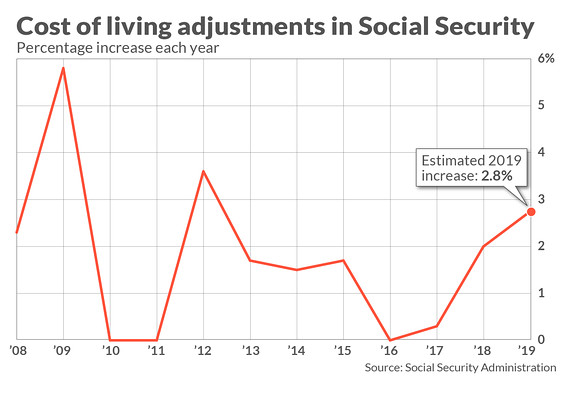
Retirement benefits are likely to rise about 2.8% next year
Retired Americans who collect Social Security can look forward in 2019 to the biggest increase in benefits in seven years.
Retirement benefits are likely to rise about 2.8% next year, based on the formula that determines annual cost-of-living adjustments in Social Security. It would mark the biggest gain since a 3.6% advance in 2012.

The government will make it official on Thursday after the morning release of September’s consumer price index. Increases in Social Security benefits are tied to the CPI.
One wild card: Hurricane Florence. Powerful storms sometimes lead to temporary fluctuations in inflation. As such the cost of living adjustment could range from as low as 2.5% to as high as 3%.
In 2018 the average beneficiary got about $1,405 a month. A 2.7% increase would amount to $38 a month or $456 for a full year.
Whatever the case, the increase in 2019 is sure to be welcomed by the 60 million-plus Americans who receive Social Security benefits, it’s not because the government has become more generous. Social payments rise in tandem with inflation — and inflation has been rising.
In theory benefits are merely supposed to keep up with inflation, but some people are affected more or less than others.
Retirees who are healthy, own their own homes and don’t drive much are likely fare best. But those who rent, drive frequently or need lots of medical care won’t do as well.
How come? Much of the increase in inflation this year is tied to higher rents, gasoline prices and health care. For seniors who spend a lot of money on those things the increase in Social Social benefits probably won’t cover all their expenses.
The annual cost of living increase is determined by taking the average rate of inflation from July through September and comparing it the same three-month period a year earlier, using an index known as CPI-W.


